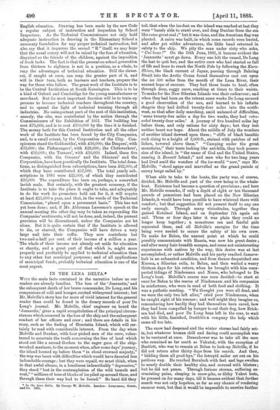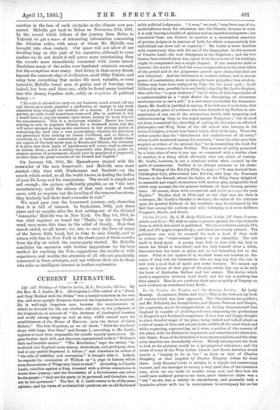IN THE LENA DELTA.•
WITH the main facts contained in the narrative before• us our readers are already familiar. The loss of the ` Jeannette,' and the subsequent death of her brave commander, De Long, and his companions of cold and hunger, excited widespread interest ; but Mr. Melville's story has far more of vivid interest for the general reader than could be found it the dreary records of poor De Long's journal. Mr. Melville, chief engineer on board the `Jeannette,' gives a rapid recapitulation of the principal circumstances which occurred in the loss of the ship and the subsequent conduct of her officers and crew ; and there are details in his story, such as the finding of Henrietta Island, which will certainly be read with considerable interest. From the day when Melville and Dunbar, with four picked men of the crew, volunteered to ascertain the truth concerning the line of land which stood out like a second Goshen to the eager gaze of the shipwrecked mariners, to the moment when, after some days' journey, the island loomed up before them "in cloud-crowned majesty," the way was beset with difficulties which would have daunted less indomitable courage ; but they were repaid, we must think, when in that awful silence, in a loneliness indescribably " depressive," they stood " lost in the contemplation of the wild tumult and rout," "millions of tons of blocks of ice piled up around them, and through these their way had to be forced." So hard did they toil, that when the ice-foot on the island was reached at last they were "barely able to crawl over, and drag Dunbar from the sea like some great seal ;" but it was done, and the American flag was planted. A cairn was built, in which some records were buried, and after yet wilder adventures, the little band returned in safety to the ship. We pity the man under sixty who asks, " Oui bona f" On the 10th June, 1881, it became evident the Jeannette ' must go down. Every one left the vessed, De Long the last to quit her, and the entire crew who had started so fall of life and hope to reach the North Pole by following the SuroS7viwo, the black current of Japan, passing through Behring Strait into the Arctic Ocean found themselves cast out upon the ice 500 miles from the mouth of the Lena River, their nearest hope of succour. They had three boats to haul, often through deep, soggy snow, reaching at times to their waists. To make for the New Siberian Islands was their endeavour; and when they had been on the retreat some weeks De Long secured a good observation of the sun, and learned to his infinite chagrin they had drifted twenty-four miles into the northwest, so that after daily marching, amid unheard-of difficulties, `some twenty-five miles a day for two weeks, they had retroceded twenty-four miles.' A journey of five hundred miles lay before them, and only rations for sixty days ; but they lost neither heart nor hope. About the middle of July the wonders of another island dawned upon them ; " cliffs of black basaltic rock rising to a height of 3,000 ft., stained with patches of red lichen, towered above them." "Camping under the great mountains," their tents looking like ant-hills, they took possession of the island, in "the name of God and the 'United States, naming it Bennett Island ;" and men who for two long years had lived amid the wonders of the ice-world "now," says Mr. Melville, " stood agape and marvelled as the grand parade of snowy bergs sailed by."
When able to take to the boats, the party was, of course, divided, Mr. Melville and part of the crew being in the whaleboat. Existence had become a question of provisions ; and here Mr. Melville remarks, if only a depot of eight or ten thousand pounds of pemmican had been placed on the New Siberian Islands, it would have been possible to have wintered there with comfort ; but that suggestion did not present itself to any one early enough. Through many vicissitudes, together they gained Kotolnoi Island, and on September 7th again set sail. Three or four days later it was plain they could no longer keep together ; a monstrous sea and fearful gale separated them, and all Melville's energies for the time being were needed to secure the safety of his own crew. To make for Belun, the nearest point at which he could possibly communicate with Russia, was now his great desire ; and after many hair-breadth escapes, and some not uninteresting experiences with natives by the way, this desire was at last accomplished, or rather Melville and his party reached Jamavelock in an exhausted condition, and from thence despatched one Kusma, a Siberian exile, to Belau, and then waited a weary thirteen days for his return, when he brought with him unexpected tidings of Nindemann and Noros, who belonged to De Long's boat. Melville's course was soon decided—to start at once for Belun to the rescue of Nindemann.and his companion in misfortune, who were in need of both food and clothing. It was a pathetic meeting. " We thought you were all dead, and we were the only two left alive," cried poor Nindemann, when he caught sight of his rescuer; and well might they imagine so, remembering how hardly they had themselves been saved, how they had been compelled by hunger to eat their dog, how Ericksen had died, and poor De Long been left in the rear, to wait with his little, famished, frostbitten company the help which came all too late.
The snow had deepened and the winter storms had fairly setin, but whatever human skill and daring could accomplish was to be ventured at once. Danenhower was to take all the men who remained as far south as Yakutsk, with the exception of Bartlett, who was to remain at Belau to look-up Melville, if he did not return after thirty days from his search. And then, " bidding them all good-bye," the intrepid sailor set out on his perilous way. He reached Buruloch with feet and legs swollen to nearly double their healthy size, and covered with blisters ; but he did not pause. Through furious storms, suffering excruciating pains, sleeping in snow-pits, or• filthy Yakut huts, he pressed on for many days, till it became evident that further search was not only hopeless, as far as any chance of rendering succour went, but that it would be impossible to survive further exertion in the face of such obstacles as the climate now presented. Melville got back to Belun on November 27th, 1881.
In the record which follows of the journey from Belun to Yakutsk we get a mass of interesting information concerning
the Siberian exiles, with many of whom Mr. Melville was brought into close contact. Our space will not allow of our
dwelling long on this part of his narrative, although to some readers we do not doubt it will prove more entertaining than the records more immediately connected with Arctic travel Doubtless many of the exiles were hardened criminals enough, but the exceptions were many. And living in that snoivy desert, beyond the outmost edge of civilisation, amid filthy Yakuts, and away from everything that makes life most valuable, or even
tolerable, Melville found men of genius and of learning rare indeed, but here and there one, while he found many banished into this dreary, hopeless exile, solely on suspicion of political
heresy :—
"No exile is allowed to carry on any business, teach school, till the soil, labour at a trade, practice a profession, or engage in any work otherwise than through the medium of a master. If I wanted any service, an exile would sometimes come and offer to perform it, but I would have to pay his master, upon whose bounty he must depend for remuneration. This is a monstrous mistake. Russia has been striving in vain to populate Siberia for a thousand years, and she will never succeed as long as she continues in her present policy of converting the laud into a vast penitentiary, wherein the prisoners are prevented from making an honest livelihood, and so driven, if criminals, to a further commission of crime. Beyond doubt there are rogues of the very worst type in Russia and Siberia, but certainly it is plain that their mode of punishment will never tend to elevate or reform them ; and it is utterly impossible that Siberia, under its present system of government, should ever be populated or improved, as have been the penal colonies of the French and English."
On January 9th, 1882, Mr. 1)anenhower started with the remainder of the men homeward ; and Melville once more
started—this time with Nindemann and Bartlett—on the search which ended, as all the world knows, in finding the bodies of poor De Long and his companions. The record is simple and sad enough ; the picture sufficiently graphic, as on "the lone mountain-top, amid the silence of that vast waste of Arctic snow, with no requiem but the howling of the remorseless storm, they tenderly laid their dead comrades to rest."
We must pass over the homeward journey, only observing that it is full of interest. In September, 1882, just three' years and six months after the first setting-out of the ill-fated 'Jeannette,' Melville was in New York: On May 1st, 1884, he was chief engineer on board the Thetis,' on his way Northward once more, this time to 'the relief of Greely. How that search ended, we all know ; too late to save the lives of many of the heroic little band, but in time to save Greely, and to return with him to New York in the short space of three months from the day on which the rescue-party started. Mr. Melville concludes his narrative with further suggestions for the best method for reaching the Pole, suggestions the results of wide experience, and worthy the attention of all who are practically concerned in these attempts, and not without their use to those who take an intelligent interest in further exploration.



































 Previous page
Previous page